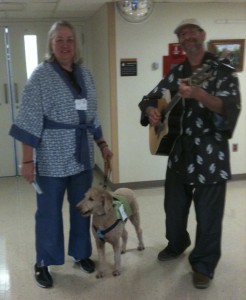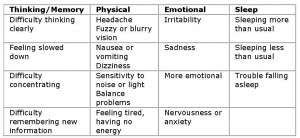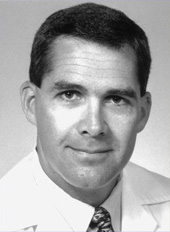Four years ago Rorie Lee slipped on the ice and hit the back of her head. “I went right back to work,” she shared with me recently. “Everyone said you’ll be fine, you just had a concussion. It’s no big deal.” But, it was a big deal. Rorie, who has a Ph.D. in health studies from Temple University and was an educational instructional designer at Maine Medical Center, ended up losing her job and going on disability. All because she fell and hit the back of her head on the ice and suffered a concussion.
Concussions are a big deal
Here’s what can happen when your head takes a hard blow like Rorie’s did. Your brain slams against the inside of your skull and then ricochets and slams against the opposite side. Rorie lost consciousness but most people with concussions don’t pass out. Most people also recover quickly and completely. The problem is that diagnosing a concussion isn’t always easy because the signs are often more functional than structural. That means they don’t show up on an MRI or a CT scan and instead, the person just doesn’t feel right. Some signs may show up immediately, but others may not be noticed for days or even months. Once a highly organized individual with an almost photographic memory, Rorie now struggles to accomplish routine tasks or learn new things.
Signs and symptoms of concussion
(traumatic brain injury)
Life as she once knew it changed dramatically for Rorie — she lost her professional identity, self-confidence, independence, and ability to earn a living. She is now a member of Brain Injury Voices, a volunteer group of people in Maine who have experienced varying types of brain trauma. Members of the group shared their personal experiences recently at the 2nd Annual Conference on Defining Moments in Brain Injury. New England Rehabilitation Hospital, the Neuroscience Institute at Maine Medical Center, Goodwill Neurorehab Services, Lakeview Rehabilitation, RiverRidge Center, and NLB Consulting sponsored the Conference.
Concussion risks for high school athletes
Also speaking was Dr. Bill Heinz, a physician with OA Centers for Orthopaedics. He’s a sports medicine specialist who treats a fair number of concussions and works tirelessly to educate parents, students, coaches, and athletic trainers about the risks for young athletes, whose brains are especially vulnerable. The CDC recently reported that emergency department visits by people 19 and younger for concussions has increased by 62 percent in the past decade. Dr. Heinz believes that’s only the tip of the iceberg. “More than half of student athletes who get hit in the head are not even aware they have a concussion,” he explained to conference participants. “They may not feel right, but don’t understand the severity or don’t want to let down the team or be pulled from the game.”
When in doubt, sit them out
Dr. Heinz recommends two tools that schools can use to help determine if a student has a concussion.
- Evaluation by a trained professional
- Neuro-cognitive computerized testing, such as imPACT. The test is especially helpful if baseline testing was done before the athletic season started.
Because diagnosing a concussion can be tricky, he urges school athletic trainers, nurses, and coaches to err on the side of caution. His mantra: When in doubt, sit them out.
- No return to play in the same game even if symptoms go away. Sometimes symptoms take a while to show up.
- Send home with a responsible adult
-
No alcohol or substance use
-
OK to give Tylenol to relieve pain
Managing concussions at Cape Elizabeth High School
With the help of Dr. Heinz, several Maine schools have developed concussion management programs. Cape Elizabeth High School, for instance, has been doing baseline imPACT testing of all student athletes for several years. The past few years the $1000 annual cost has been paid for by a grant from the Maine Concussion Management Initiative. The school takes concussions very seriously says Cape’s principal Jeff Shedd. When students have concussions they not only have to take a break from athletics but also from academics. According to Dr. Heinz, the goal is to give the brain a rest so it can heal. He warns that “Returning to function is an even bigger issue than returning to play,” We worry about affecting brain function and not getting it back.”
Mandating concussion education
Several states have passed concussion laws recently, some mandating formal concussion policies. In Maine, pending legislation would require that parents receive and sign a concussion policy sheet from school that contains updated information about concussions, including risks. Educating people about the risks is key says Jeff Shedd, even if it is sometimes challenging. “When we were growing up as athletes ourselves, people would laugh off concussions and say things like kids got their bell rung or got a stinger or something like that. It was a matter of toughing it out, and what medical science is telling us now is that’s a real mistake because for some students it can be a really, really hurtful injury.”
Rorie Lee may not be a student athlete, but she is a classic example of how easy it is to misjudge the impact of what may seem like a minor blow to the head. Four years later, she is still trying to regain some control of her life.




Boy, Diane, you are exactly right about how difficult it is to judge concussion and traumatic brain injury. Six years ago, my mom was on her way down the hill to the library in Rumford, walking to her mystery book group. She slipped and banged her head against the street lamp she’d apparently been reaching towards. Observation at the hospital lead to admission at CMMC, with surgery following four days later. She slipped into a coma and died later in the month, but all I remember thinking is that she talked to me when I first got to the hospital! The doctor said she’d be fine in a few days! Being alert and careful to prevent injury, and then following up on any serious head impact, is important at any age. Thanks for writing this.
Deborah McLean, http://www.MaineSeniorGuide.com
Deborah, thank you for sharing your story. It breaks my heart to hear what happened to your mother. It’s so important to get the word out to as many people as we can about how serious a concussion can be. Speaking of getting the word out — I love what you’re doing with http://www.MaineSeniorGuide.com.
I thought I just had whiplash…
6 months later and I am miserable.
throbbing head…brain swelling feeling, full ears, numb face, word retreival issues, stuttering, among sooo much more.
I would love advice on where to go for help.
Post concussion syndrome is REAL.
Sabrina,
If you haven’t already, I strongly urge you to see your doctor or a neurologist. In the Portland area there is a wonderful brain injury support group called Brain Injury Voices. Here’s the contact information:
Carole Starr, co-facilitator
braininjuryvoices@maine.rr.com
(207) 200-4210
The support group meets regularly at New England Rehabilitation Hospital of Portland, which has a brain injury rehabilitation program. You can try calling outpatient referral: 207 662-8377 for more information about the rehab program.
There is also an organization based in Augusta called the Brain Injury Information Network. It lists a lot of resources on its website:
http://www.biin.org
Contact person:
Marcia Cooper
mcooper@biin.org
(888) 893-0123
Best of luck to you.